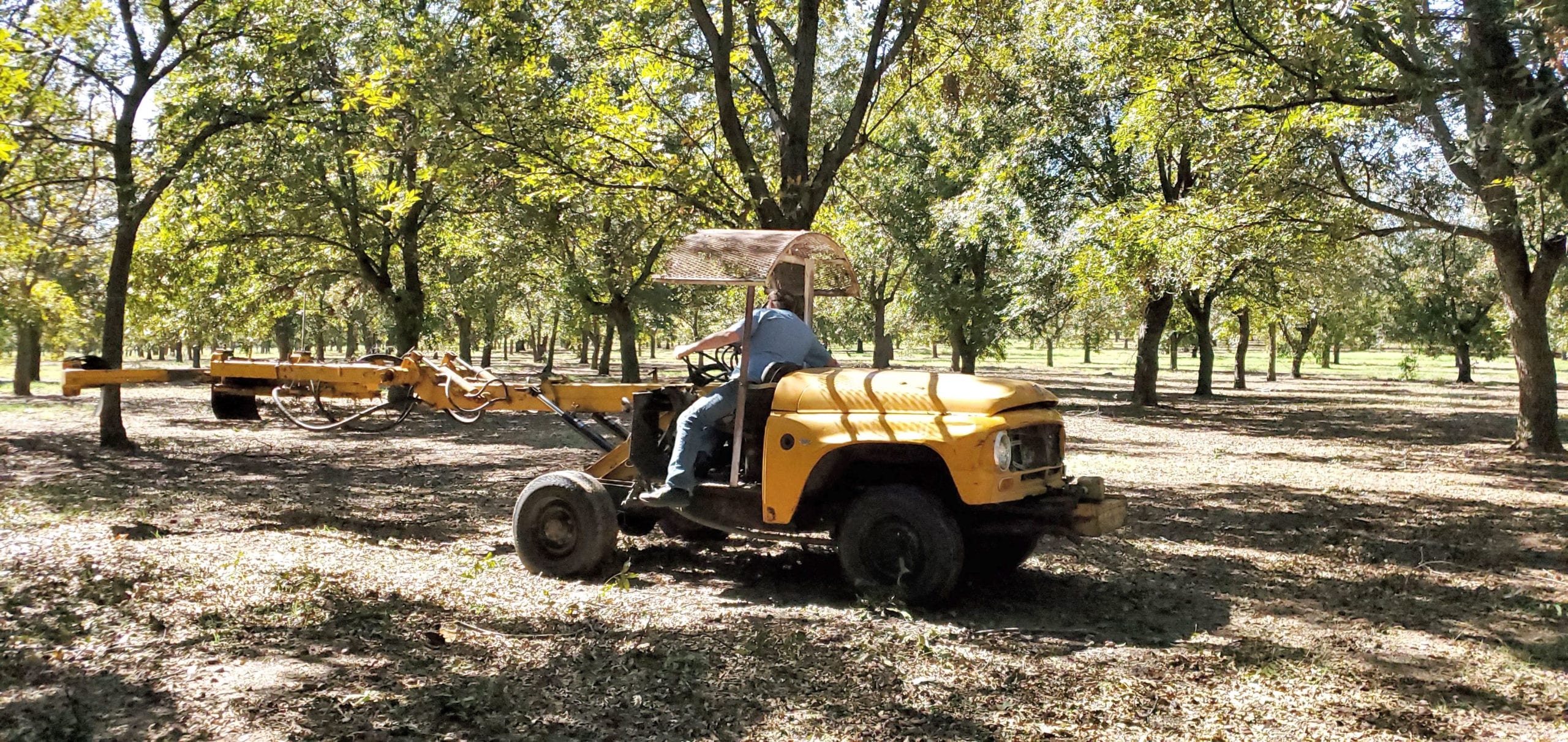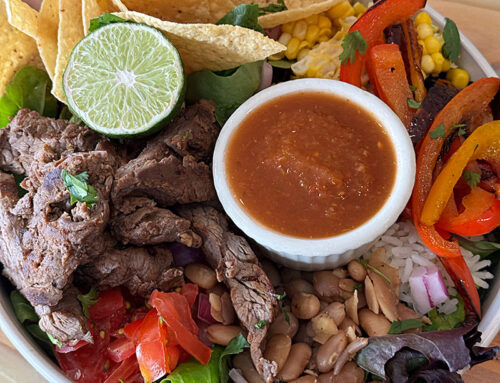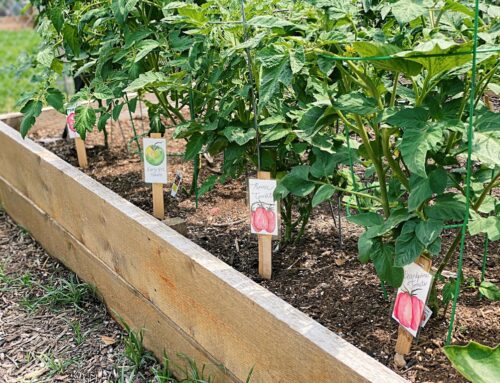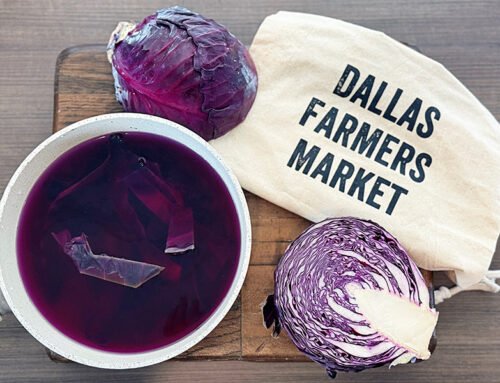The visit to North Texas Pecans was a great success; our team was grateful to learn more about the State Tree of Texas and the process of harvesting pecans. Russell, the owner of North Texas Pecans, has operated over 50 acres of pecan groves since 1997 when he moved from a hobbyist to a true farmer. On the farm we learned about the distinct types of pecans, their characteristics, and which types grow best in Texas. Cheyanne, Russell claims, is the best of the bunch for pecans in Texas. On the property you will also find Pawnee and Cherokee varieties thriving.
Evidence of the prior day’s storm was found everywhere, pecans scattered the ground and a few full grown trees were toppled over. The past few years have raised unfavorable conditions for Texas agriculture as a whole–pecans have not escaped the consequences of unseasonably dry springs and summers followed by surprisingly wet falls and unpredictable severe weather. Russell has lots of work to do to collect the pecans that were knocked to the ground. There is a short window of only a few days that pecans can lay on the wet ground before the quality degrades. Harvest season is “all-hands-on-deck” at North Texas Pecans. There are no days off for this husband and wife team once the cool autumn air brings the first ripe pecans. The occasional help of their neighbor’s kids is warmly welcomed, though not always productive. Harvest days run sun-up to sundown and no moment is wasted. You’ll notice that in October until late November, Russell won’t be found at the Dallas Farmers Market. He’s busy harvesting his crop for 2020. We forgive him though for the fresh, decadent crop he brings to market come winter!
The process of collecting pecans is no small feat. In order to loosen pecans that may otherwise cling to the limbs, Russell deploys a specialized machine known as a “shaker” and boy does it ever. Russell’s shaker is actually a redesigned (upcycled if you will) highway patrol vehicle of the 1960s that now has the added feature of an extended arm which latches onto the truck of a pecan tree and vigorously shakes. “Shake” is one word for what this machine does but it feels more like a small earthquake. Violent but effective–the pecans fall to the ground and the tree is unharmed. Pecan trees in this grove have experienced a number of shakings since their planting in 1971 and have suffered no adverse side effects to the localized earthquakes thus far. We’ve captured a video of the process of shaking the pecan trees. We found it hard to contain the thrill of seeing such a unique machine in action. We watched with the same wonderment of a child who’s just watched a train rumble by. Amazing!
While the shaker was certainly a show-stopper, the harvest continues and it’s time to gather the valuable pecans. Russell heads to his workshop, hops on his tractor with a “picker” attached, and slowly begins navigating the orchard rows. Small fingers in the picker rotate has he passed, catching the pecans and pulling them into the machine. Once picked, the pecans are piled up in a holding compartment. “Don’t stand behind me,” Russell warns, “the picker throws dust and bits as I go.” After a few rows, the holding compartment is full and Russell heads back over to the workshop and shows us the “blower”.
Just as fun as it sounds, the “blower” separates quality pecans from less desirable pecans and debris. The gathered pecans are pulled into the machine while air blows light weight pecans out to the side and allows weightier pecans to pass to the next stage. Generally these lightweight pecans are of a lower quality, with the nut not fully grown, and not worth harvesting. The blower rumbles loudly as pecans fly and a conveyor belt churns out the newly sorted pecans. Russell watches intently, picking out any pecans that he deems “wimpy” before they are sorted into bags for sale.
If the pecans have made it past the blower and Russell’s discerning eye, they will pass to the sorter. Here they are tumbled through different holes to determine their size and grade. As they pecans fall they are shifted to one of three bags. Each is filled and eventually brought to market. Russell sorts up to 50,000 pounds of pecans each year, yet even at such a lofty number, he says he’s a little guy compared to many of the operations in Texas that can harvest over 1.7 million lbs a year.
When asked about the quality of his product versus the big guys, Russell attests to the freshness of his pecans. His pecans are shelled with his weekly customers in mind–maintaining the freshness until the last moment before coming to the market. Russell’s business strategy is a simple philosophy true to most farmers, yet rare amongst corporations, “a commitment to long term customer relationships, and high quality customer service.” While pecan growers are subject to market fluctuations in the wholesale business, Russell enjoys selling at the Dallas Farmers Market where market prices are far more stable. While the statistic is often quoted, we feel it can never be overstated: Farmers receive, on average, only 10 cents per dollar spent on food at the grocery store. At the farmers’ market, farmers are about to take home the full value of their crops. Russell says it may be more work to sell direct to customers at the market but it’s worth-while to talk to folks and meet new people.
Learn more about this nutritious, local crop at Texas Pecan day at the Dallas Farmers Market. Say hello to Russell in The Shed before you take home some of his delicious pecans–the first crop of the season!








